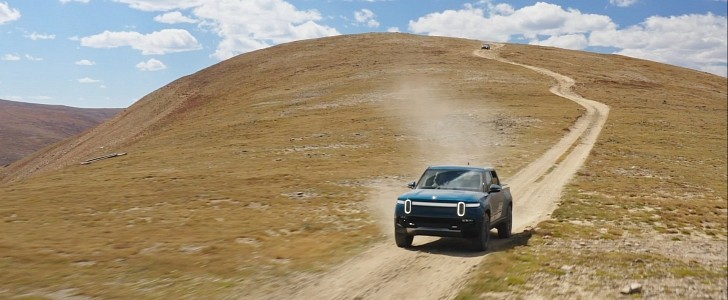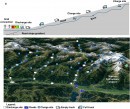Harnessing hydropower is a popular way of transforming the potential energy of water into electricity. The way it works is by storing the water in an upper reservoir and releasing it into the lower reservoir while forcing the water to move turbine generators to produce electricity. But new ideas aim at changing the old ways completely.
The traditional way of generating electricity using hydropower does not work on smaller streams of water in the mountainous regions, despite the huge potential. That’s because building the required reservoirs would have a negative environmental and social impact. A fresh idea by a team of researchers from the International Institute for Applied Systems Analysis (IIASA) could be a game-changer though, allowing to generate electricity without having any negative impact on the environment.
The crazy idea is to replace the lines connecting the two reservoirs in a hydropower plant with electric trucks that carry the water in containers. These would be filled with water from the stream at the top of the mountain and would slide down on regenerative braking until they reach the lowest level. At this point, the water would be released back into the stream, while the truck battery would be charged. The energy stored in the truck’s battery could then be sold to the grid or used by the truck itself to transport other goods.
“The ideal system configuration is in mountainous regions with steep roads, where the same electric trucks can be used to generate hydroelectric power from different locations. This increases the chances that water will be available,” explains Julian Hunt, the leading researcher in this project.
According to the study, this technology is competitive with solar, wind, and conventional hydropower, simply because it does not necessitate huge investments. Cost estimates show a levelized cost of $30–100 per MWh, which is considerably cheaper than conventional hydropower at US$50–200 per MWh.
“This technology does not require dams, reservoirs, or tunnels, and it does not disrupt the natural flow of the river and fish passage. The system requires only roads, which already exist, charging and discharging stations similar to small car parks, a battery facility connected to the grid, and the trucks,” explains Hunt.
Of course, the regions with the biggest potential to benefit from the Electric Truck Hydropower technology are those with the highest mountains, like the Himalayas and the Andes. Looking at the global level, the study shows that the new technology could generate 1.2 PWh electricity per year, which is equivalent to about 4% of global energy consumption in 2019.
The crazy idea is to replace the lines connecting the two reservoirs in a hydropower plant with electric trucks that carry the water in containers. These would be filled with water from the stream at the top of the mountain and would slide down on regenerative braking until they reach the lowest level. At this point, the water would be released back into the stream, while the truck battery would be charged. The energy stored in the truck’s battery could then be sold to the grid or used by the truck itself to transport other goods.
“The ideal system configuration is in mountainous regions with steep roads, where the same electric trucks can be used to generate hydroelectric power from different locations. This increases the chances that water will be available,” explains Julian Hunt, the leading researcher in this project.
According to the study, this technology is competitive with solar, wind, and conventional hydropower, simply because it does not necessitate huge investments. Cost estimates show a levelized cost of $30–100 per MWh, which is considerably cheaper than conventional hydropower at US$50–200 per MWh.
“This technology does not require dams, reservoirs, or tunnels, and it does not disrupt the natural flow of the river and fish passage. The system requires only roads, which already exist, charging and discharging stations similar to small car parks, a battery facility connected to the grid, and the trucks,” explains Hunt.
Of course, the regions with the biggest potential to benefit from the Electric Truck Hydropower technology are those with the highest mountains, like the Himalayas and the Andes. Looking at the global level, the study shows that the new technology could generate 1.2 PWh electricity per year, which is equivalent to about 4% of global energy consumption in 2019.






